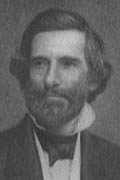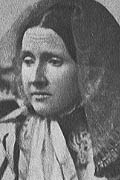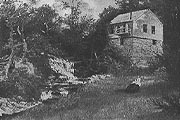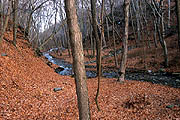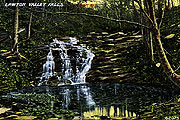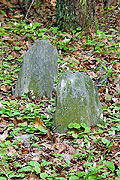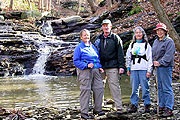|
|||
| Excerpts From "This Was My Newport"[1] by Maud Howe Elliot:
CHAPTER IV - Lawton's Valley: Arriving "1 have tended six pretty cradles,
A Long time ago, when I was very young, there was a gentle hackman named Anthony, who lived in Fall River. His business was to meet the trains from Boston and drive passengers to their destinations. Rain or shine, he was always waiting on the platform near his roomy old hack with its friendly white horses. He was there faithfully at his post on a day of terrific storm, when the heavens opened and the rain descended in bucketfuls; when the terrible roar of the thunder followed so close on the sharp flash of the lightning zigzagging through the purple wrack that my mother cried out:
"lt must have stack that time !'' For she, who was in the main a fearless woman, was dreadfully afraid of lightning. To the aforesaid Anthony on this day of terror, there descended from the afternoon Boston train a white-faced lady followed by six frightened children and a shrieking Irish servant. To their chorus of, "Oh, Mr. Anthony, what shall we do?'' he replied : "You come right along home with me, Mis' Howe. This ain't no day for you to be traveling. Wife'll fix you up a hot cup o' tea." Wife did; doughnuts, too, she "fixed up" for the chilled and frightened youngsters. We sat in her neat kitchen, and warmed ourselves at her stove, and were comforted. It was late in the afternoon when the weather cleared and it was thought safe to start for the twelve-mile drive to Lawton's Valley. We and our belongings were packed away in Mr. Anthony's hack, the band-boxes inside with us in case It should rain again, the trunks on behind, the basket of provisions beside the driver. Very soon the swaying of the carriage put some of the children to sleep. The drive seemed endless. From time to time the little ones awoke and looked out to and the night pitch-dark, the horses plodding slowly over the rain-washed road. It could not have been far from midnight when the hack stopped and the sleepy children, cross and hungry, tumbled out at the door of the house at Lawton's Valley. A candle and matches were found, and a lantern provided by Mr. Anthony was lighted. The key shrieked protestingly in a rusty lock but finally yielded, letting the party into the damp, mildewy house. On the dining-room table stood the remains of the last meal served before we left the house in the autumn-the local chore woman entrusted with "cleaning up" had proved faithless to her trust. Before sleep was possible, trunks must be unpacked, a fire kindled, sheets warmed before it-for damp linen was that gentle lady's bete noire. She flew hither and yon, getting supper with the help of the elder children; exhorting, comforting the younger ones and the demoralized servant; finally making the beds with her own beautiful hands. In the bedrooms, green mildew encrusted the wails and furniture, and the old boots left behind in the closets. The "Newport smell" of mould was in our nostrils as we fell asleep. When we woke, the sun poured into the nursery windows. There was a delicious odor of coffee and frying bacon in the air. In mad haste, faces were washed. The real bath would come later-down in the valley in the big pool below the mill. The whole happy band of us spilled out upon the grass under the apple trees to hunt for birds' nests, robins' eggs, lady's-slippers or wild strawberries. The terror of a thunderstorm was the only timid trait my mother ever showed us. When any of us had a fit of burglars in the night, she would get up, light her candle, and go over the house alone from cellar to garret. This seemed perfectly natural to us children. In those days Lawton's Valley was a pretty lonely place at night when my father was absent. He came down from Boston to the Island only for week ends. One dark and rainy evening as we were sitting gathered around my mother, listening to her singing, there came a loud knocking at the door. The maid-servants had gone to bed, and Mother answered the door. Two strangers stood outside and asked a lodging for the night. She took a good look at the men and bade them enter, found some sort of supper for them, and showed them up to the big spare room at the top of the house. She took the precaution of creeping upstairs on tiptoe when she thought them asleep, and locked the door from the outside, carefully opening it in the morning before they woke. We took this quite as a matter ot course. There was no house of entertainment within six miles; the storm was raging; what else was there to do? Our house stood on the side of a steep hill. Between house and road was a thicket of ailanthus-one enormous tree, a superb specimen-the others of varying size crowding around the parent stem to the detriment of both. Mother had a special fancy for these "trees of heaven," and when a strong wind came up, she would stand at the window and watch their waving branches, calling our attention with the words: "My green family tossing their heads.'' She loved Lawton's Valley above all other places in the wide earth; perhaps that is the reason that it is so dear to me. Papa always said the house should have been built on the hilltop, because of the superb view of landscape sloping to the Bay. At that time I did not agree with him, for if the house had been there it would have spoiled our royal play-house-the finest in the world we thought it then, and think it now. The "great rock" formed the grand staircase to the state parlor at the tip top of the hill. It had a carpet of fine gray moss patterned with orange lichen, and side wails of juniper trees whose gray-blue berries served to fill our dolls' dessert plates. The cups and saucers were made of oak leaves pieced together cunningly with bits of the stalk. A little lower to the right was the back stairway and the kitchen, with the most perfect oven hollowed from the side of the rock that the heart of child could desire. Here we baked the juniper berries, served in fairy feasts. [1] This Was My Newport, Maud Howe Elliot , Published in 1944 by the Mythology Co, Cambridge, MA. |
 Old water mill located on property owned by Dr. Samuel Howe and his spouse, Julia Ward.This mill was powered by the water falling in Lawton Valley.
|
| [Search!] | [Survey] [Planning] [Projects] [Outreach] | [What's New!] |
|
Copyright © 1999-2003, REWHC. All Rights Reserved 204 have visited |
||


